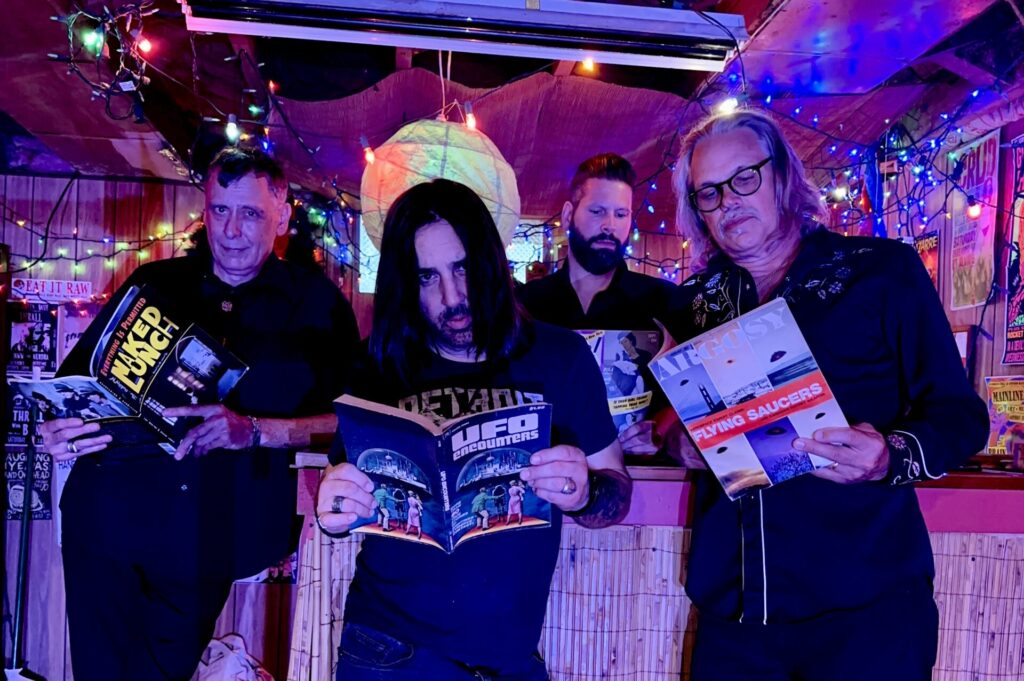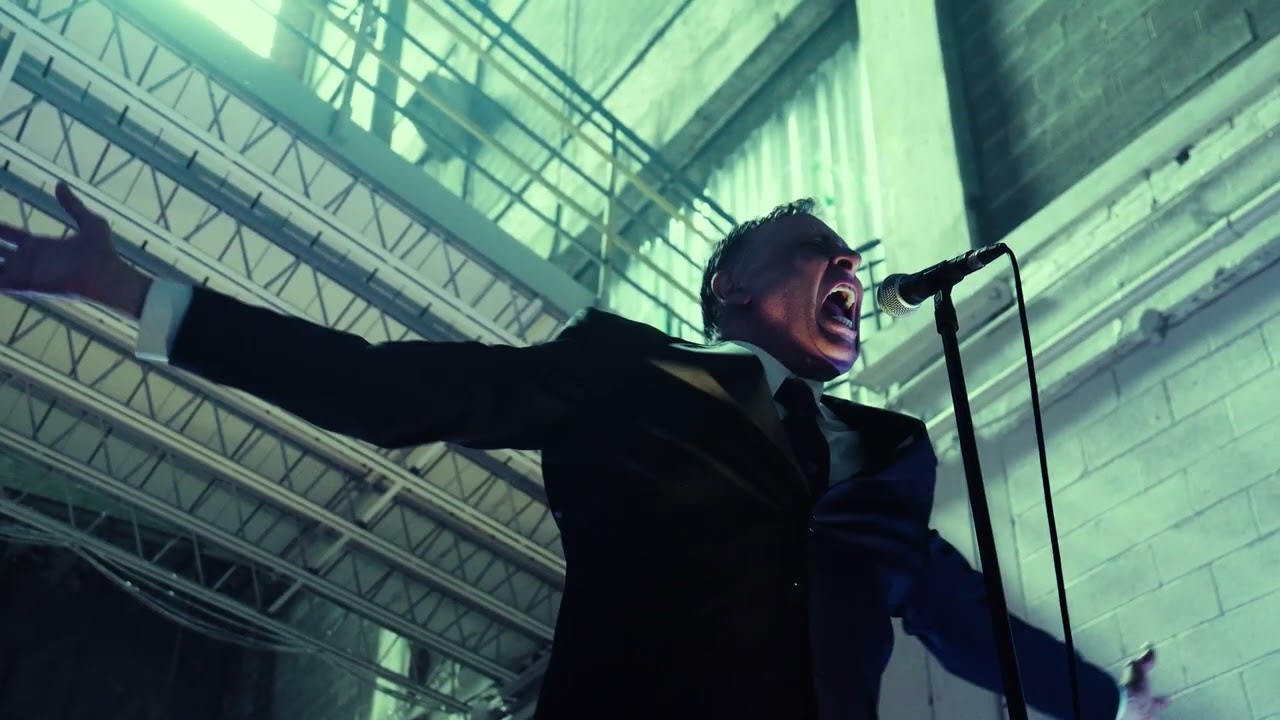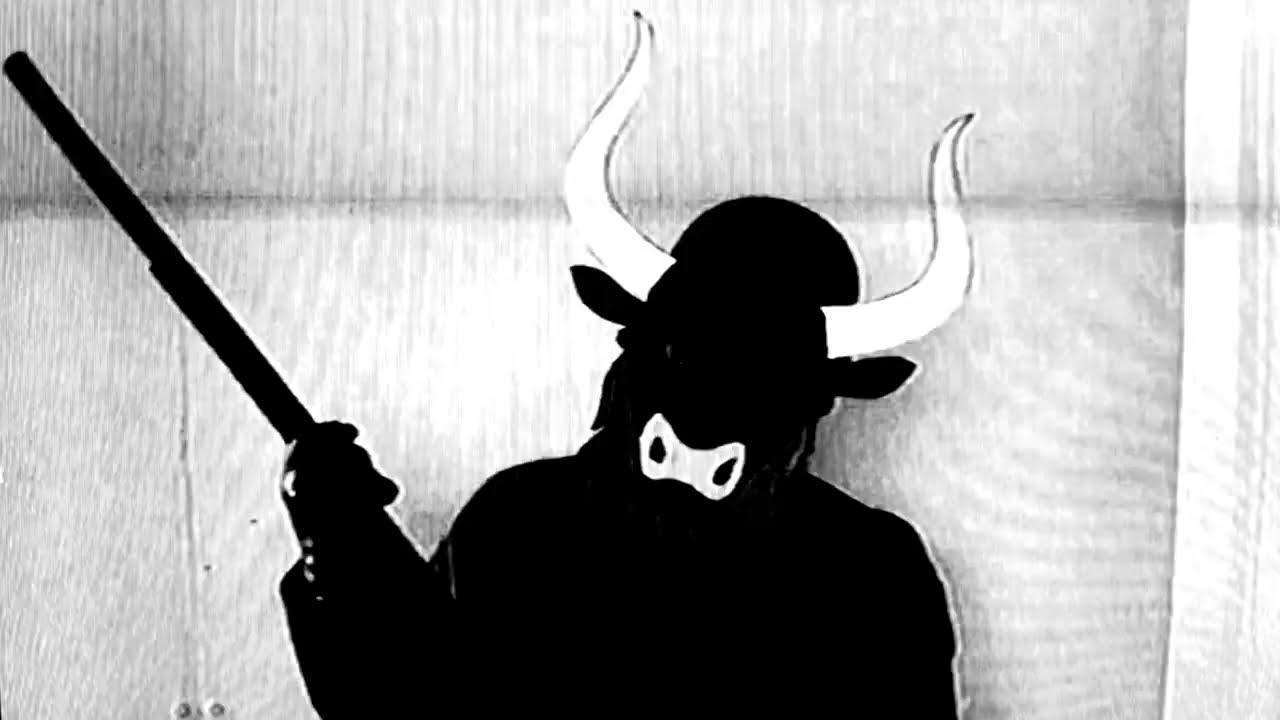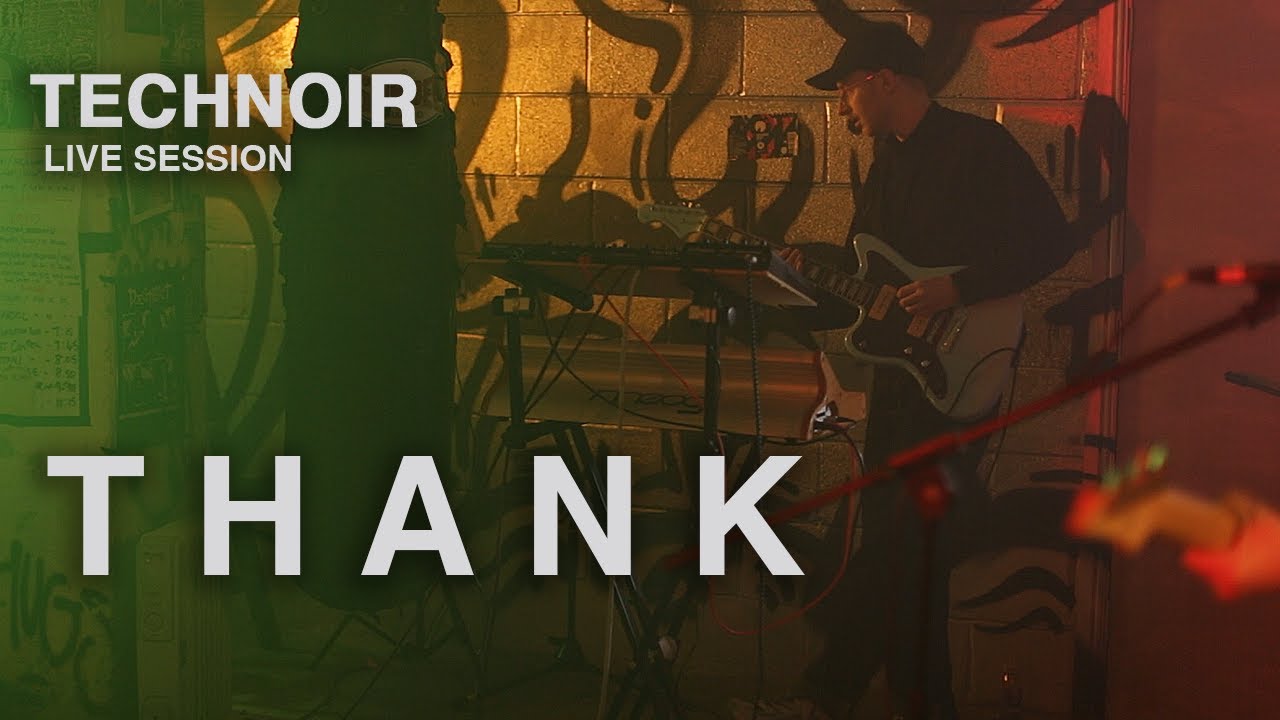When is a band not a band? It sounds like a question The Riddler would pose to a grown billionaire dressed as a bat. In homage to both Frank Gorshin and Paul Dano’s portrayals of that iconic supervillain, I am typing this in bright green spandex with a binbag strapped to my face.
There is some controversy surrounding the new record by God Bullies. The accusation is that this legendary noise-rock band’s vocalist, Mike Hard, has more or less rebranded Thrall, the ensemble he’s fronted more recently, as a resurrected incarnation of his older group. There are other members of the band, which was active in its initial form between 1986 and 1995, who are no longer around to grant their blessing or otherwise object. Guitarist David L. Livingstone passed away in 2023 and is credited as co-writer on two songs from the new record, As Above So Below. Truth be told, these numbers were intended for a different project called Pig Harvest. Hard sees the new album, in part, as a heartfelt tribute to Livingstone and another fallen compadre, Johnnie Johnson.
God Bullies’ original bassist, Mike Corso, is livid with this development. He’s called the singer and his current crew “a bunch of backstabbing hacks” and has published thousands of words of correspondence intended to prove that Livingstone, too, would have wished to “put the kibosh to this nonsense”. Dead Kennedys were always among God Bullies’ influences. The similarities now stretch from the musical cues to this very public spat.
Some fans might, therefore, wish to boycott As Above So Below on the grounds of it being made by what Corso calls a “wet dream version” of the band, consisting of Hard “and his weak-minded little minions”. It was recorded by the late Steve Albini, incidentally, which cannot necessarily be taken as a sign of endorsement given he would work with anybody who’d pay him. One admirable exception to that rule was U2. Others will rush to hear the first God Bullies album in 30 years, whether or not they think the band name ought to be presented in inverted commas.*
With God Bullies looking like the Bucks Fizz of noise rock, it raises questions about legitimate legacies and rock & roll reboots. Is the so-called Hole album from 2010 to be considered part of the true canon? Courtney Love herself wouldn’t defend it anymore, having since admitted she should’ve released the patchy Nobody’s Daughter under her own name. Napalm Death have no original members but Shane Embury’s been leading them since 1987 and has departed founder Nic Bullen’s blessing. Less approving is Mick Harris, their drummer from 1985 to 1991. But then there’s an ever-dwindling list of people who Harris doesn’t despise.
Should Sweet 7, the Sugababes album released after the departure of Keisha Buchanan, be quietly excluded from the pop trio’s comprehensive boxed sets? Perhaps we must take all instances on a case-by-case basis. For some reason, I quite like the idea of Hawkwind carrying on with whoever is in them now even after the great Dave Brock pops his clogs. They could then refresh themselves with new personnel over and over again, on a gradual basis, so the band might continue to exist for as long as human civilisation does too. Thus, Hawkwind could constantly regenerate into the future like a space rock Doctor Who. (I realise that’s the name of the show, not the character. Don’t write in.) On the other hand, Thin Lizzy fronted by Ricky Warwick doesn’t appeal to me personally.
*Or with an asterisk after it. Like what Mclusky did. (For a bit.)
God BulliesAs Above So BelowReptilian
There are those who think this record shouldn’t exist or that Mike Hard should’ve released it under a different band name, given the lack of O.G. God Bullies who accompany him. If we put those issues to one side and concentrate solely on the music, As Above So Below is an exemplary noise rock record, plainly in the spirit of the genre’s Reagan-era heritage but alert to the shittiness of the present. In that respect (among others), the album makes a suitable accompanying piece to The Jesus Lizard’s new one, Rack. The caustic rhythm guitars and intermittent lead solos verge on heavy metal, yet the overall approach remains murky and feral. Mr Hard comes across as equal parts enraged and panicked. “Everything will be okay / Help is on the way / Tomorrow is a new day,” he groans at one point. This ostensible optimism could sound no less convincing. To draw on myself like an arrogant prick, as I wrote in my Electric Wizards book, noise rock makes an increasing amount of sense as its performers get older, because they no longer look like fresh-faced homeboys with their whole lives ahead of them, and grow further and further into the genre’s traditionally bleak sound and outlook. That’s definitely the case here. It’s a “fake” band in some people’s eyes. Even if that’s true, this record makes a convincing and compelling case for its right to exist.
Sun & Sail ClubShipwreckedHeavy Psych Sounds
Sun & Sail Club could easily suit tQ’s punk or metal columns more readily than this one which is named after a mellow number by Pink Floyd. Hear me out, though. For one thing, Shipwrecked is on the Heavy Psych Sounds label which must mean something. Secondly, the members of Sun & Sail Club have psych-rocking pedigree. Guitarist Bob Balch and drummer Scott Reeder are members of Fu Manchu. On bass is another man named Scott Reeder, from The Obsessed and Kyuss. Don’t expect a bunch of chunky stoner songs about dune buggies, however. The riffs might be fuzzy but the pace is frantic. That means they’re basically making hardcore punk in the vein of Black Flag or OFF! Maybe that’s what you get if you take Fu Manchu and speed it up at least thrice. And here’s the clincher. They’re fronted by Tony from Adolescents. So there’s plenty of engaging ranting up front, too. There may have been some occasional slower and phatter moments on 2015’s The Great White Dope. Little of that nonsense occurs this time. There are a couple of jazzy acoustic guitar pieces to bookend the album but they can almost be ignored. The most part is “basically the soundtrack of me beating the shit out of my guitar,” as Balch says; the results then embellished by the other players, without much preciousness. Is it psych rock? Who cares?
Terry GrossHuge ImprovementThrill Jockey
This trio’s debut album, 2021’s Soft Opening, set the bar high. Even so, it’s hard to disagree with the title of their second. There are four songs this time rather than three, so that’s a decent percentage upgrade for starters. Not to be confused with the American journalist whose name they’ve pinched, the band are Phil Becker, Donny Newenhouse and Phil Manley (who you might remember from the genre-busting Trans Am). ‘Sheepskin City’ is a fast-tempo space-/krautrock beast of an opener with an underlying doomy heaviness. Newenhouse’s muscular bass notes are deservedly high in the mix throughout, despite having to compete with Manley’s rocket fuelled distortion and cosmic noodling. All three members work as studio engineers, by the way, so the whole recording sounds absolutely marvellous. The energy is sustained for ‘Sales Pitch’. Partly due to the way Manley sings, this one seems to be asking what Jane’s Addiction could’ve been like if they really knew how to rock hard in a psychedelic fashion, instead of concentrating on their sleazeball preoccupations and punching each other in the face. The longest cut, ‘Full Disclosure’, lumbers slowly in a stoner-like fashion. Again, a colourful range of pedal-effect fireworks fly from the feet (and fingers) of Phil. Terry Gross seem at their most formidable when Becker is put through his paces so the speed lifts again on ‘Effective Control’, with bonus cowbell. It might not be that noticeable when listening, and it certainly isn’t distracting, but for a band named after a journalist there’s an aptly high standard of vocabulary in the lyrics. “Hypothesised”. “Derivations”. “Nanoscopic”. “Hierarchical”. “Opaque.” “Proxima Centauri”. Consider Terry Gross’s latest exam passed and their grades boosted accordingly.
LouseCreep CallRiot Season
There are a few seconds of feedback at the beginning of Creep Call’s opening number, ‘Worm’, before the band are assaulting the ears at full pelt with their greasy repetitive riffs, unhinged distortion and fevered shouting. Their style has the dark colour and thickness of Marmite. Like the famous yeast extract, Louse are not for everyone but, as the old saying goes, if you go to your grave without enjoying Marmite then have you ever truly lived? Louse feature members of Foot Hair and The Shits. Creep Call is, we are told, “the result of a (wasted) life’s work honing and toning the platonic ideal of single-riff noise rock”. As that statement implies, the album continues as it starts without any need for a palette-cleansing ballad or handful of tracks produced by a DJ from a privileged American dynasty. The diversity is in the detail. Something that sounds like a dentist’s drill bores into the jaw during ‘Material’. The desecrated glam riff on ‘You Don’t Eat The Bull’ is splattered by post-Fun House saxophone. Some keys are poked in background of ‘Phrogging.’ The lyrical subjects sound interesting too: “wholesome ruminations on perpetual home invasion, road-side pornography addiction, perfecting a cannibalistic diet, and an unmistakable cowboy/line-dancing anthem…” Not that you can make much of that out because Louse’s singer, “The Captain”, is screaming lower in the mix than David Yow on those early Jesus Lizard records. Louse have a vision and on Creep Call they accomplish it. To paraphrase Lou Reed, “One riff is fine. Two riffs is pushing it. Three riffs and you’re into jazz.”
ThankI Have A Physical Body That Can Be HarmedBig Scary Monsters
Thank are one of those bands, few and far between, who just keep getting better. One element that’s helped lift the bar on their latest boisterous transmission is the appointment of powerhouse drummer Steve Myles. “I look like a children’s television presenter and he looks like a cage fighter,” frontman Freddy Vinehill-Cliffe pointed out – accurately – when previewing material earlier this year. At its core, the Leeds group’s style is still defined by its chunky basslines, wiry post-punk licks, dirty disco pumpery and viscid synth textures. Now with added hyperactive drumming! That moustachioed kids’ telly host, meanwhile, yells wryly observational and often funny lyrics which recall the withering eye of Andrew “Falco” Falkous of Mclusky, Future Of The Left, Christian Fitness and pesto passion fame. On ‘Woke Frasier’, Freddy sarcastically mocks the right-wing scaremongering of the culture wars: “Bad news: The Simpsons has gone woke! . . . What is a boy to do?” Other moments address the awkwardness of social interaction and the futility of preparing for the rapture. Theirs is a chaotic sound, for sure. Yet it is a controlled and carefully composed chaos. Deceptively clever? Is that what we call it?
Hollow EyesSo Many Easy Ways To PayRiot Season
Besides those mentioned above, are there any other factors that help us to differentiate the good end of noise rock from the genre’s less successful offerings? The noise rock that doesn’t quite cut it, I reckon, tends to be that which is too stiff and precise. You’ve got to keep it loose, people. That’s why Crazy Horse cut the mustard as a serviceable noise rock outfit while The E Street Band, for all their uplifting jubilance, do not. We’re not here to discuss two of the few arena artists worth paying to see, however. Hollow Eyes are a supergroup for those who know that bands like Terminal Cheesecake and Bong are far super-er than ones populated by Dave Grohl or Tom Morrello. They are Gordon Watson, Mike Vest, Dave Cochrane and David Sneddon, and the noise they make with “homemade, modded pedals and destroyed guitars” is looser than Fred Durst’s massive pants. There are five scorching jams on So Many Easy Ways To Pay. The best moments are when Watson is singing because it seems like he’s been gargling petrol. By contrast, ‘Hawaiian Snow / The Great Destroyer’ is more of a stock Vest instrumental in the tradition of his old group, Blown Out, and could’ve been recorded by any number of his hundred or so different projects. It’s not bad. It just lacks the gasoline guzzling that makes this particular group stand out. By contrast, check out ‘Procrastinator’. It suggests an alternative reality in which Lemmy took control of Hawkwind, instead of forming Motörhead, and flew their rocket ship directly into an alien planet with a principal terrain of bogland.
Charlie ButlerStress FractureSelf-Released
There was, for the most part, a playfulness and lightness of touch to Charlie Butler’s Wild Fictions cassette from earlier this year. The same cannot be said of the solo instrumentals presented on his new one. Stress Fracture is a sharp title for an LP that was recorded, as Butler describes it, “during a period of pretty poor mental health.” It contains four pieces which can be divided neatly into two categories. ‘Deeper Isolation’ and ‘Rollwright’ recall the glacial drone meditations of early Earth, Sunn O))) at their barest, Nadja when they’re not roaring aggressively or the least electronic works of the seemingly defunct Barn Owl. Less asphyxiating, more on the rustic side and, presumably, a little more positively motivated are ‘Dust’ and ‘Remnant’. These two feel a bit like wandering through the forest at dusk and stumbling on David Pajo, jamming alone by a campfire, as he waits for his portable stove to heat up the tin of baked beans.





